The English Department is pleased to announce the winners of its 2023-2024 awards. There were many eligible and competitive submissions for the writing prizes, and a strong field of candidates for all the awards. We congratulate this year’s winners, and thank our donors for their generosity.
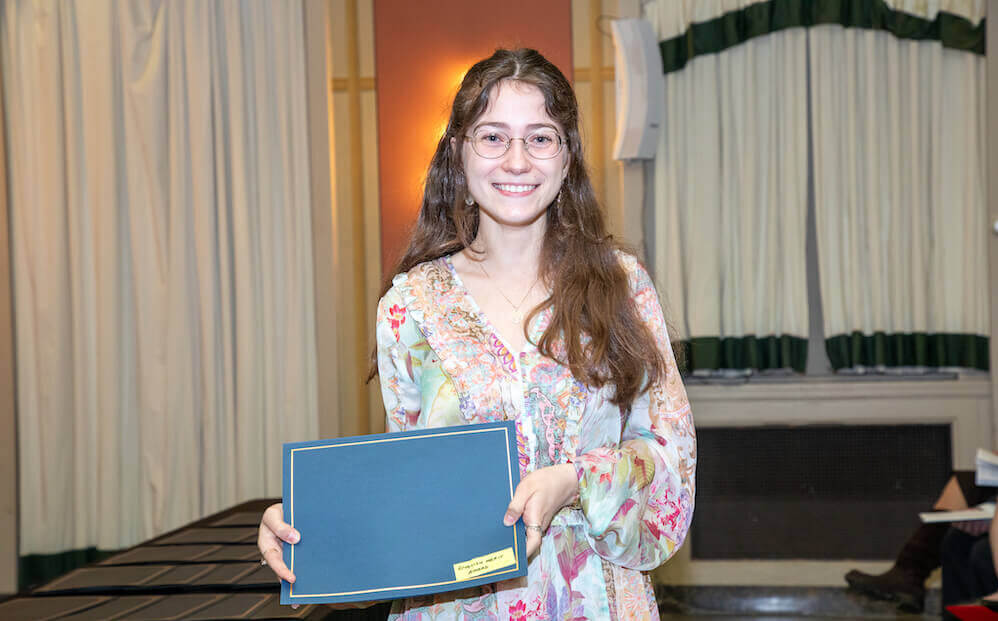
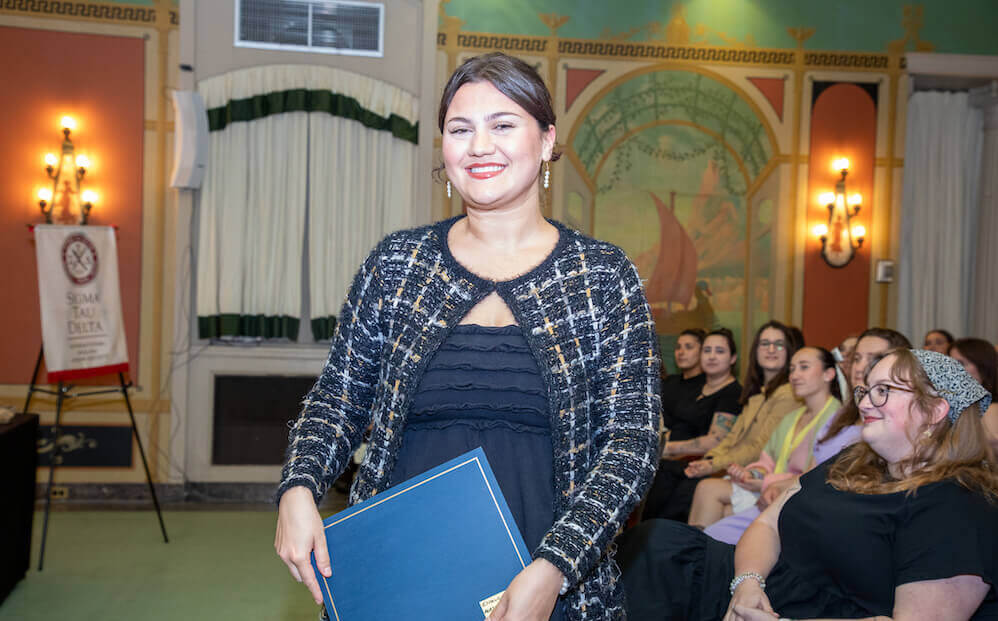
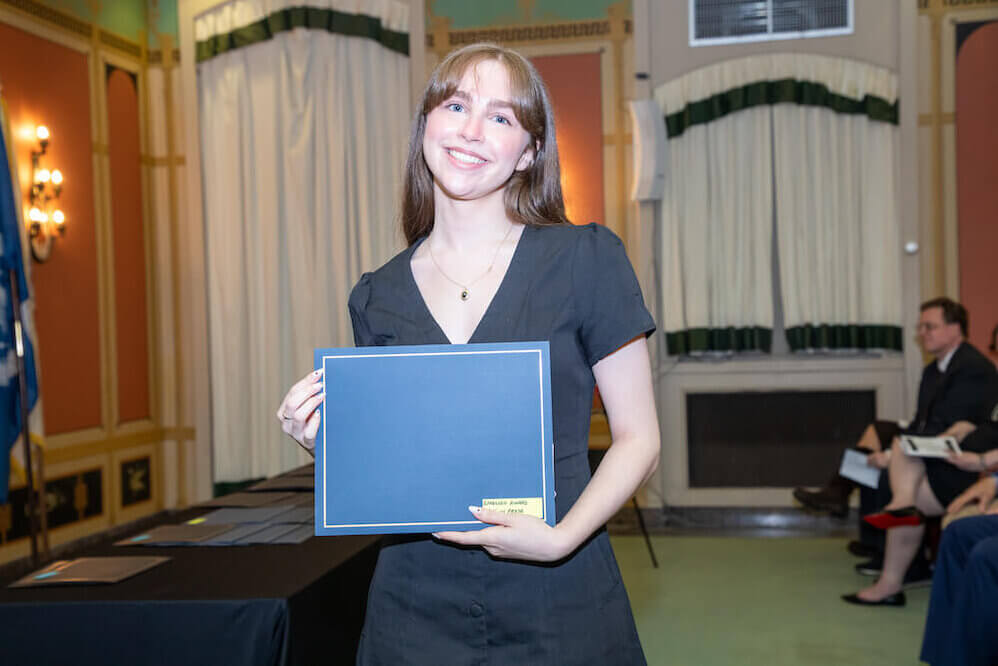
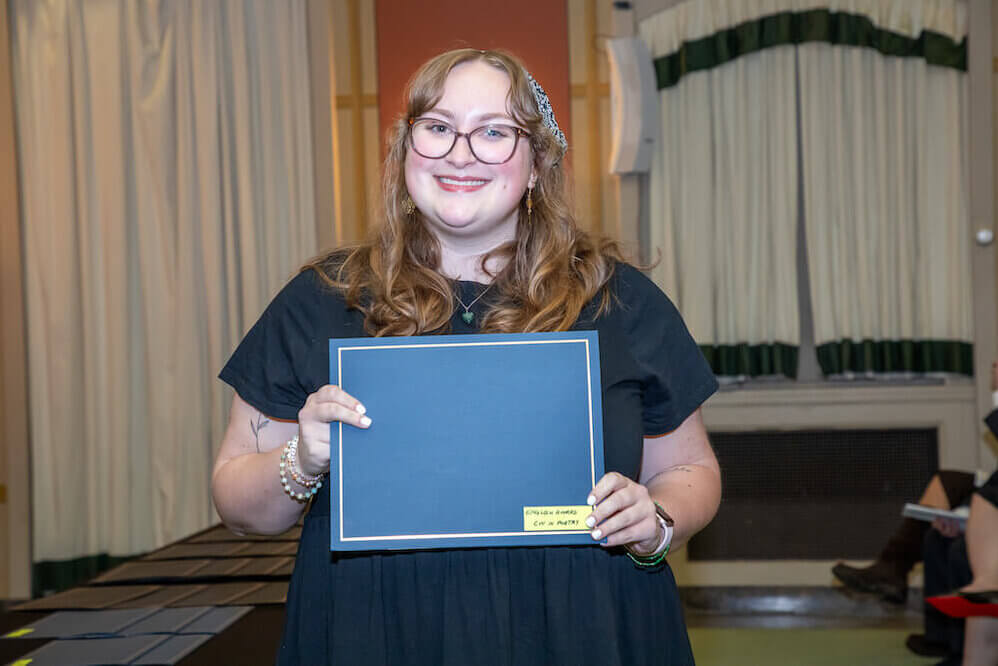
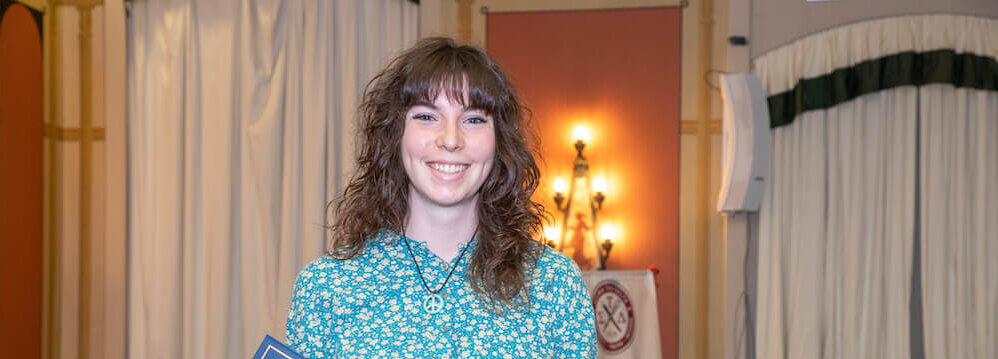
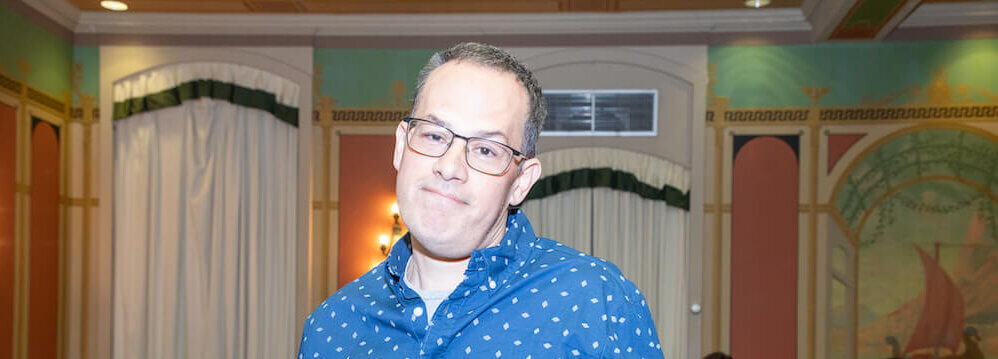
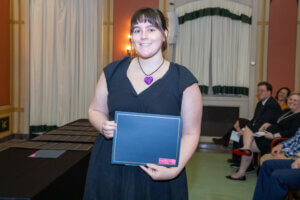
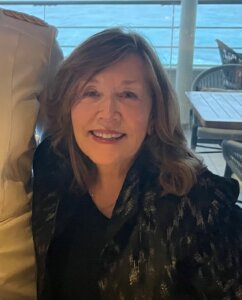



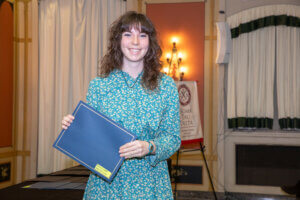
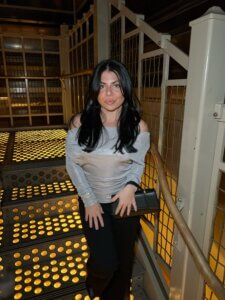
Zafira Demiri – The English Merit Award
Zafira is incredibly honored to receive this award. After graduating from a STEM high school with little motivation pushing her in that direction, she had to make a difficult decision in reconsidering her path. She holds a piece of advice given to her after her high school graduation very close to heart in her everyday studies: “read everything.” The decision seemed as obvious then as it is now—literature is her calling. She delights in learning and applying literary theory and criticism: from feminist theory to posthumanism, specifically ecocriticism. She’d like to thank the entirety of the English Department for fostering environments and experiences that led her to explore her interests and that have greatly inspired her work. She’d also like to thank her family for their support: without them, none of it would have been possible. She is excited to continue her academic journey in the field, and to read everything that she can!
Hana Vozzo – The English Award for Academic Writing
Hana Vozzo is a Senior majoring in English and minoring in Psychology who works for Writing Services. She hopes to return to Monmouth as a graduate student to pursue a master’s degree in English with a Literature concentration. In the future, Hana is interested in becoming a professor, so she would like to thank all the wonderful members of the English Faculty who have inspired her, especially Dr. Fury, Dr. Werner, and Dr. Moscaliuc. Her paper, written for Dr. Moscaliuc’s Postcolonial Literature class, is a sharp and detailed analysis of the sea as a symbol in Derek Walcott’s epic poem “The Schooner Flight.” Hana poignantly analyzes the sea as representing the narrator’s individual and cultural identity, which she supports with her exceptional application of postcolonial theory. She will be presenting her paper at the Seton Hall English Undergraduate Literature Conference this month.
Mary Schuld- Honorable Mention, The English Award for Academic Writing
The English Awards committee recognizes Mary’s paper, “Why do Contemporary Women Novelists Write Tragic or Unresolved Endings?” as an honorable mention for the English Award for Academic Writing
Melaina Carrara – The English Award for Creative Writing in Prose
Melaina’s piece, titled “Where The World Was Empty,” is the second part to a set of stories about twin sisters Mary and Ginger – the daughters of a preacher. Set in the Midwest, this piece explores themes of religion and guilt as it follows Ginger who has snuck away from her hometown to get an abortion. She grapples with her faith and struggles to find hope when she finds herself in increasingly dire situations over the course of 24 hours. Melaina incorporates the unique use of taxidermy as a metaphor for eternal damnation in this compelling and tragic piece.
Sabrina Chung – Honorable Mention, The English Award for Creative Writing in Prose
The English Awards committee recognizes Sabrina’s work titled “Pickled Elephants” as an honorable mention for the English Award for Creative Writing in Prose
Olivia Frew – The English Award for Creative Writing in Poetry
Olivia’s illuminating poems, “Maple,” “Worms,” and “Mars,” use elements of nature to visualize concepts well-known to her and the women around her. “Maple” is a meditation on womanhood and the responsibility of being designated a bearer of life. “Worms” discusses climate anxiety through a creature not often thought about. Finally, “Mars” serves as a vehicle for the longing for what once was in relationships that we regret losing. Olivia is a senior English major with a minor in Creative Writing, and she plans to go to graduate school for Library Science after her time at Monmouth. Her hope is to either work in a school or perhaps in the dusty basement of a museum.
Carlee Migliorisi – Honorable Mention, The English Award for Creative Writing in Poetry
The English Awards committee recognizes Carlee’s poem titled “Not Your Father’s House” as an honorable mention for the English Award for Creative Writing in Poetry
Carlee Migliorisi – The English Award for Graduate Study
After graduation, Carlee is looking forward to sticking around Monmouth to pursue the MA+MFA program here and she would not have the motivation to do so without the continuous mentorship of Professor Ken Womack and guidance of former professor Michael Thomas. As she begins grad school this summer, she plans on working on several original research projects focused on Bruce Springsteen, including a chapter that will be contributed to a book on nostalgia and music set to come out in early 2025. She will also be going across the pond this summer to Liverpool to give a presentation at an international Beatles conference. In addition to this, Carlee will be returning to research with Professor Womack this fall on the upcoming companion book to Living the Beatles Legend: The Untold Story of Mal Evans.
John Vurro – The English Award for Graduate Creative Writing in Prose (Fall 2023)
The Fall 2023 winner of the Award for Graduate Creative Writing in Poetry goes to John Vurro. As the submissions for this award were adjudicated by an external judge, Scott Cheshire, we would like to include the description of the evaluation of John’s work: “From its bold and daring opening line, ‘Attachments’ is as funny as it is wise. Vurro is refreshingly original, while clearly fascinated by the Melville legacy. This is a book that seems to be as much about family as it is other books, and I could not put it down.” John Vurro is an MFA student. He is working on his novel Attachments and a poetry chapbook called Nocturnes. For his MA, he completed his novel Play, Rewind and a poetry chapbook We, All of Us.
Nicole Mautone – The English Award for Graduate Creative Writing in Prose (Spring 2024)
The Spring 2024 winner of the Award for Graduate Creative Writing in Prose goes to Nicole Mautone for her Work entitled Lessons. Submissions were adjudicated by an external judge, Rachel B. Glaser. “Lessons” stood out for its excellence in description and dialogue, creating a compelling and moving account of a teenager moving toward “maturity” while absorbing the inappropriate advances of a former teacher who coaches her for a vocal performance while in high school. With references to everything from typewriters to Buffy the Vampire Slayer, the story draws the reader into the mind and emotions of its narrator. Following a successful academic career as an undergraduate at Monmouth, Nicole is currently a first-year graduate student pursuing her MA in English Literature. She attributes her success to the many wonderful professors and advisors in the English department who guided her through her Bachelor’s degree, and now her graduate degree!
Dorothy Doyle – The English Award for Graduate Creative Writing in Poetry (Fall 2023)
The Fall 2023 winner of the Award for Graduate Creative writing in Poetry is Dorothy Doyle. As the submissions for this award were adjudicated by an external judge, Yesenia Montilla, we would like to include the description of the evaluation of Dorothy’s poems: “The works presented in this submission felt complete and part of a collection that I would not only read but return to over and over. I particularly loved the way the poet leaned into form and was not afraid to dance with various subject matters. The speaker of these poems not only offered the reader a glimpse into the interior spaces of their life but also connected us to the world out there. There were moments in this submission that surprised and moved me, moments that I won’t soon forget like “Bathsheba in a Bathrobe” or the “biscuits cooling on the open windowsill”. The longing in these poems also grabbed hold of my own nostalgia-filled-heart and honestly still have not let go. In summary, I was deeply saddened when I got to the end, the poet left me wanting more — that’s good poem-making.” Dorothy is in the MFA in Creative Writing program. She is grateful for the constant inspiration and support of her fellow MA/MFA candidates, and her poetry professor, Dr. Moscaliuc.
Veronique Manfredini – The English Award for Graduate Creative Writing in Poetry (Spring 2024)
The Spring 2024 winner of the Award for Graduate Creative Writing in Poetry goes to Veronique Manfredini for her poetry collection entitled Echoes of Life. As the submissions for this award were adjudicated by an external judge, Maurya Simon, we would like to include the description of the evaluation of Veronique’s poems: “I was impressed by this poet’s willingness to experiment with a variety of styles and forms, including free verse, a prose elegy, rhyming couplets, and the traditional ballad stanza (quatrains). I also laud how, in several poems, this poet delves into the erotic quite openly and effectively. In doing so, she/he/they provide/s us with an array of sensual and sensory details that enhance the poems’ dramatic situations. In “(Parentheses),” my favorite poem among the eight submitted, the poet avoids using clichéd and sentimental language—a great risk in a love poem—and employs, instead, a cascade of wonderful details and images that heighten the action. The poem’s declarative, anaphoric single lines that alternate with the poem’s quatrains, are quite unexpected and wonderful: “I am champagne bubbling into crystal cups,” and “I am wax dripping onto a tablecloth,” and “I am chocolate melting on strawberries.” Another poem, “Nonna,” also avoids sentimentality as it pays homage to, and eulogizes, the poet’s grandmother. The poem’s extended metaphor, or conceit, which compares the grandmother’s visits to a hairdresser to attending a special Catholic mass, is compelling and memorable. Bravo/brava to this writer!” Veronique Manfredini is an Italian writer and 1st year graduate student pursuing the dual MA/MFA in English and Creative Writing. She attributes her success to her advisor, Dr. Mihaela Moscaliuc.
Claudia Huzar – The Caryl and Charles Sills English Education Scholarship (2024-2025)
Claudia Huzar is an English and Education major with a concentration in Creative Writing. A rising junior, she has been an exceptional student in her time here at Monmouth, earning a 3.87 overall GPA with a 3.857 GPA in the English major. She has been described by professors who have been fortunate enough to have her as passionate about education, an excellent writer, highly engaged and a pleasure to have in class. For these reasons and more, the English Department Student Awards Committee members have selected Claudia as the recipient of the Caryl and Charles Sills English Education Scholarship.
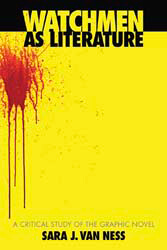
Leah Coppola ’23M co-wrote the article, “Mission and COVID Statements: Writing Centers and Opportunities for Discussing Social Equity,” with Dr. Courtney Werner. The article was published in the fall issue of The Learning Assistance Review (Volume 28, #2 Fall 2023).
Andrea Sodhi ’13 ’17M has been named Ocean Township Elementary School’s (OTES) 2023-2024 Teacher of the Year.
Sara Mazzone (née Van Ness) ’08 ’11M has written a book titled Watchmen as Literature: A Critical Study of the Graphic Novel, published by McFarland and Company in 2010.
The study began as a paper for an independent study and grew into her undergraduate thesis project, both under the direction of Dr. Stanley Blair of Monmouth University’s English Department. In addition, she completed some of her research and writing of the book during a graduate-level independent study with Dr. Blair in Spring 2009. The book explores the graphic novel’s reception in both popular and scholarly arenas, and how the conceptual relationship between images and words affects the reading experience. Other topics include heroism as a stereotype, the hero’s journey, the role of the narrator, and the way in which the graphic layout manipulates the reader’s perception of time and space.
Sara graduated summa cum laude in May 2008 from Monmouth University with a Bachelor of Arts degree in English and secondary education. Her thesis was awarded honors by both the Honors School and the English Department. As an undergraduate, she received the Wayne D. McMurray School of Humanities and Social Sciences Award for Student Excellence and the New Jersey Distinguished Student-Teacher Award. She completed her M.A. in English in Fall 2011. Dr. Mazzone was named Red Bank Regional High School’s 2023-2024 Teacher of the Year.
MASTER’S THESES
Theses in Progress
Christopher D. Hankenson, “Long-Eared Epic: Watership Down and Questions of Readership.”
Theses and Manuscripts Completed
Carolyn Cid, A Mother’s Love. Spring 2024. Distinction.
Samirah Sartor, “Unseen Affections: The Caregiver Figure in the Novels of Jane Austen.” Spring 2024. Distinction.
Samantha Walton, “Cultural Literacy vs Cultural Attentiveness: Intertextuality and Interpretation in Hamlet.” Spring 2024.
Nicole Collins, “Genius in Madness: The Connection Between Mental Illness and The Poetry of Sylvia Plath and Anne Sexton.” Fall 2023.
Anthony Clark, Something to Remind Me. Spring 2023.
Barbara Coleman, Wake up and Smell the Coffee. Spring 2023.
Leah Coppola, “Gender-as-Rhetoric: The Rhetorical Complexity of Transgender Identity and the Challenge to Performativity in Redefining Realness and Tomorrow Will Be Different.” Spring 2023. Distinction.
Dorothy Doyle, Confessions of a Late Blooming Baby Boomer & Other Lies. Spring 2023.
Kevin Flook, Corpseman. Spring 2023.
Jora Lam, Where Did You Sleep Last Night? Spring 2023.
Damian Luboch, American Gambler. Spring 2023.
Malia Padalino, “Failing to Thrive: Coping with a Chronic Childhood Illness.” Spring 2023.
Jennifer Rivera, Salvation. Spring 2023.
Sarah Van Clef, Birdman: A Memoir in Memoriam. Spring 2023.
Corinne Cavallo, The Deer Catcher. Fall 2022.
Allison Long, Field Notes for Future Ghosts. Fall 2022.
Jenna Puglisi, Totally Fine. Fall 2022.
Marci Rubin, The Next Shot. Fall 2022.
John Vurro, Play, Rewind. Fall 2022.
Melissa Badamo, “The Lost Daughter of Grover.” Spring 2022.
Faith Bates, Terror, Avant-garde. Spring 2022.
Christopher Bogart, The Beast. Spring 2022
Jennifer Broman, “Here Be Monsters.” Spring 2022.
Anthony Clark, “The Wreckage of Spring.” Spring 2022.
Faith Earl, “Songs to Sick Blood.” Spring 2022.
Mallory Green, Nightshift. Spring 2022.
Stephanie “Jora” Lam, Hiraeth. Spring 2022.
James McConville, “My Fading Voice Sings of Love’: Romanticism, Silence and Myth in ‘The Dead’ and Grace.” Spring 2022. Distinction.
Nicholas Morris, “Existential Graffiti.” Spring 2022.
Malia Padalino, “Reflections from the Ballet Barre.” Spring 2022.
Nicole Picinic, “Bearing Witness and Early Social Protest Writing Through Modernist Reportage Poetry in Muriel Rukeyser’s “The Book of the Dead” (1938).” Spring 2022.
Timothy Spicer, “Southern Revisionist Nostalgia: A Contemporary Queer Reframing of Faulkner’s Narratives.” Spring 2022. Distinction.
Deanna Venezio, “The Rochester Mansion: An Insane Asylum for Victorian Women.” Spring 2022
Michelle Giles, “Yellow Wildflowers.” Fall 2021.
Michael Qualiano, The Guided and Other Trips. Fall 2021.
Sarah Van Clef, Birdman. Fall 2021.
Jason Aquino, You Could Have Hurt Me Better. Spring 2021.
Lisa Barthelme, O Father. Spring 2021.
Douglas Bornhoeft, No Scents of Magic. Spring 2021.
Chelsea Byrne, Killer Roadkill. Spring 2021.
Barbara Coleman, Wake up and Smell the Coffee. Spring 2021. Distinction.
Faith Earl, “Inventory of the Gone.” Spring 2021
Abigail Fenn, Red. Spring 2021.
Mallory Green, Keeping in Touch. Spring 2021.
Kaitlyn Lash, “No Sympathizing Movement to the Words: Wuthering Heights and the Problems of Adaptation.” Spring 2021.
Allison Long, “Superlative: Stories.” Spring 2021.
Damian Luboch, Tales of Jim Bum Bradley. Spring 2021.
Nicholas Morris, Telegony. Spring 2021. Distinction.
Jenna Puglisi, Totally Fine. Spring 2021.
Brittany Scardigno, “Intangible Violence: Manifestations of Silence in Kingston’s The Woman Warrior and Daoud’s The Meursault Investigation.” Spring 2021. Distinction.
Katelyn Snyder, “Intermodernism and British Identity in Voyage in the Dark (1934) and Farewell Leicester Square (1941).” Spring 2021. Distinction.
Connor Surmonte, Freewheelin’. Spring 2021.
MacKenzie Svarrer, Adolescence of Elektra. Spring 2021.
Amanda Wassel, “Waging War not with Weapons but with Needles: Studying Contemporary Needlework as a Form of Invitational Feminist Rhetoric.” Spring 2021.
Brittany Cote, “Isabel Allende’s The House of the Spirits: Magical Realism or Gothic Hybrid?” Fall 2020.
Charles Chipman, Turnbuckle: A Novel. Fall 2020.
C. John Schoonejongen, Take This Longing. Fall 2020.
Jason Aquino, Deified. Spring 2020.
Courtney Ball, “’Waiting for the World to be Made’ through Folklore, Food, and Feminism: An Analysis of Hurston’s Their Eyes Were Watching God.” Spring 2020.
Teresa Castellitto, “Morning Light.” Spring 2020. Distinction.
Madison Hlavach, “Emotions, Discomfort, & Ethical Responsivity: Taking the Risk to Care.” Spring 2020.
Jaimee D. Nadzan, “Haunting Space and Place in Shirley Jackson’s The Haunting of Hill House and Helen Oyeyemi’s White is for Witching.” Spring 2020.
Robert Zadotti, “Midnight.” Spring 2020.
Mary Rademacher, “A Rethinking of the Burkean Parlor in the Post-Truth Classroom.” Fall 2019.
Patrick O’Neill, Time As It Passed. Spring 2019.
Susan Schuld, “Dracula: An Intertextual, Byronic Romance.” Spring 2019. Distinction.
Nicholas Shirley, “Converting the Daily Bread: Finding Female Power Through Food Studies and Everyday Theory in Joyce’s ‘The Sisters’ and ‘The Dead.’” Spring 2019.
Mackenzie Svarrer, Cenchrus. Spring 2019.
Sally Taylor Tawil, “The Measure of a Moment.” Spring 2019. Distinction.
Kaitlyn Trebour, “Technology and Composition: How Digital Technology Affects Adolescents’ Writing Processes.” Spring 2019.
Kendall Turchyn, “’Belle of Monticello’: The Transgressive Rhetoric of Ellen Wayles Randolph Coolidge.” Spring 2019.
Matthew Yard, “The Contemporary American Wasteland in Infinite Jest.” Spring 2019.
Jeremy Mancino, “Terra Incognita.” Fall 2018.
Dawn McCloskey, “Conversing on Disability: Analyzing and Exploring How Scholars are Discussing Disability Studies, Discovering Disability in YA Literature, and Finding Disability Analyses in Composition Classrooms.” Fall 2018.
Daniel Murphy, Who is Daniel? Fall 2018. Distinction.
Michael Sefack, “What Do You Mean This Class Doesn’t Count? Negotiating the Challenges of Writing Placement in Two-Year Colleges.” Fall 2018. Distinction.
Connor White, “Waiting for the Sun.” Fall 2018.
Sara Basgaard, “Tentative Language Use in the Classroom: Who and Why, the Effects, the Influence of Gender, and Why Educators Need to Care.” Spring 2018.
Victoria DePaolo, “‘Thank You For Calling, How May I Help You?’ A Burkean Analysis of Agency as Established though Call Center Soft Skills Training Materials.” Spring 2018.
Christine DiBiase, “The Feminist Gothic: An Analysis of The Handmaid’s Tale. Preface: An Introduction to The Argument for Feminist Gothic.” Spring 2018.
John Francis, “The Queer Heroes of Horror: Gothic Entanglements with Queerness in Vampire Hunter D: Bloodlust, Let the Right One In, and Palimpsest.” Spring 2018.
Daphne Keller, “‘An Art of Humanity’: The Henry Street Narratives of Lillian D. Wald.” Spring 2018. Distinction.
Colleen King Oliver, “Unripe, Unsweet, Delicious.” Spring 2018.
Kimberly Morgan, “A Feminist Enquiry into Female Representations of the Sublime in Moby-Dick.” Spring 2018. Distinction.
Elizabeth White, “‘Jem told me I was being a girl, that girls always imagined things’: Female Narrative Voice and the Young Adult Literary Canon.” Spring 2018.
Jenna Risden, “Re-gendering the Monarchy as The Queen’s Three Bodies: Spenser’s Use of the Body Politic as a Metaphor For England’s Political State in
The Faerie Queene.” Fall 2017.
Brian Turczmanovicz, “‘Their ruin! Hence I will excite their minds:’ Mind Reading and Machiavellian Intelligence in Milton’s Satan and Shakespeare’s Cassius.” Fall 2017.
Kathryn Gehrsitz, “The Quest for the Female Hero and a Feminist Genre in Modern Young Adult Dystopian Literature.” Spring 2017. Distinction.
Ivy Hollander, “Incorporating Modernism into the Secondary Education Classroom through Studying The Sun Also Rises and Mrs. Dalloway.” Spring 2017. Distinction.
Kevin Holton,. Absolute Zero. Spring 2017.
Avi Lejbik,” Pride Prejudice and Zombies An Evaluation of Austen’s Vision of Socially Circulating Rhetoric.” Spring 2017.
Talon Ribsam, A Warm Chill Threatens. Spring 2017.
David Robbins, Cascadia. Spring 2017.
Nicholas Segreto, Monster City. Spring 2017.
Sara Haight, “Bipolar Chronicles.” Fall 2016.
Stefanie Kyak, “The Play’s the thing, Wherein I’ll Catch the Conscience of the King”: Mise en Abyme and Psychoanalysis in Christopher Nolan’s Inception and William Shakespeare’s Hamlet.” Fall 2016. Distinction.
Heather Altz, “J.M. Synge’s Subversive Archetypes.” Spring 2016. Distinction.
Philip Blizzard, “The Guarantee Group.” Spring 2016.
Courtney Castelli, “Every Colored Girl Had Been Born With One.” (Un)doing Race, Gender, and Sexuality in James Baldwin’s Another Country. Spring 2016.
Taylore Glynn, “Orchidelirium.” Spring 2016. Distinction.
Rebecca Gokberk, “Food for Thought: A New Approach to Analyzing Literary Cookbooks.” Spring 2016.
Faten Hafez, “Jane Austen: The Acts of Implication in Two Centuries of Criticism.” Spring 2016.
Abigail Maguire, “Doll Parts.” Spring 2016.
Christina Riso, “Welcoming Alternative Media into the Academy: Benefits of the Zine.” Spring 2016.
Kayla Sorbara, “The Poem and the Pomegranate: How Ancient Greek Myth Influences Feminist Theory in Evan Boland’s ‘The Pomegranate’ and Nuala Ni Dhomhnaill’s Persephone Suffering from SAD.’” Spring 2016.
Ariana Tepedino, “Gilded Trans-America: The California Gold Rush and Maupin’s Tales of the City.” Spring 2016. Distinction.
Erin Fu, “Looking Through the Kaleidoscope: Into the Genre(s) of Moll Flanders,” Fall 2015. Distinction.
Md. Shahriar Kabir, “Carol Kennicott’s Articulation of Voice in Main Street by Sinclair Lewis,” Fall 2015.
Emily Scarano, “The Rhetoric of Slam Poetry and its Potential in the College Writing Classroom.” Fall 2015.
Lisa Sofranko, “Taking Care.” Fall 2015.
Chris Bogart, “The Beast,” Spring 2015.
Eric Brown, “The Movement of Words: Misprision, Re(mis)interpretation, and Meaning in Russell Hoban’s Riddley Walker and Walter M. Miller’s A Canticle for Leibowitz,” Spring 2015.
Lauren Freda, “Alice Walker’s The Color Purple: Fourth Wave Feminism,” Spring 2015.
Amara Hand, “The Other Side of the Game: The Rhetorical Alterity of Contemporary Hip Hop,” Spring 2015.
Megan Miguelino, “Through the War-Drobe: The Restoration of National Identity and Hope in C.S. Lewis’s The Lion, the Witch, and the Wardrobe,” Spring 2015.
Danielle Pelose, “‘Fire Is Catching’: Rhetorically Igniting the Spark between Young Adult Literature and “L”iterature,” Spring 2015.
Amy Schulze, “‘Such Odious Subjects’ as Sex and Sapphism: The Obscene, Unseen, and Mundane in Virginia Woolf’s Orlando and Radclyffe Hall’s The Well of Loneliness,” Spring 2015.
Hannah Tichansky, “Paranoid Rhetoric and Spatial Obsession: Elizabeth Bowen, Kenneth Burke, and the Blitz,” Spring 2015.
William Anania, “Towards a Rhetoric of Multi-Perspectivism: An Analysis of Digital Technology’s Equalizing Effect on Professional and Amateur Criticism.” Fall 2014.
Stephen DiPalma, The Adventures of Gray Falcon: Shadows of the Indignant. Fall 2014.
Jennifer Filannino, Holy Heart. Fall 2014.
Jaclyn Nagle, “Dysfunctional Relationships, Performance and Performativity: A Comparison of Contemporary Dramas with Edward Albee’s Who’s Afraid of Virginia Wolf.” Fall 2014.
Robert Platt, “Materialism, Commercials and Rhetoric: The Production of Superficial Happiness.” Fall 2014.
Kerry Bogert, “Therapy for Muggles: Exploring Representations of Trauma and Mental Illness in Fantasy Fiction,” Spring 2014.
Corinne Cavallo, “Homeless Texts of Trauma: Elie Wiesel’s Night and the Argument of Omittance,” Spring 2014. Distinction.
Amanda Connelly, “Who the Fuck is Moi? The Effects of Consumer Culture on Identity and Reality in Brett Easton Ellis’s Glamorama,” Spring, 2014. Distinction.
Eric Farwell, “Minor Pisces,” Spring 2014.
Samantha Glassford, “‘Mysteries of Word and Glance’: Verbal and Nonverbal Traumatic Coping Mechanisms in DeLillo’s Falling Man,” Spring 2014.
Kayla Helfrich, “The Fire Starter,” Spring 2014.
Michael Mifka, “Chronicling Chinaski: Bukowski’s Ham on Rye and Lower-Class, Ethnic Male Adolescence,” Spring 2014.
Joshua Rademacher, “Were Here, We’re Queer, But Who Are We?,” Spring 2014.
Regina Betz, “Unbecoming and Be(e)coming: Eco-Feminism and the Bee Imagery of Ralph Waldo Emerson and Sylvia Plath.” Fall 2013.
Erin Fallon, “Is it Magic? The Use of Magical and Supernatural elements in Hawthorne’s The House of the Seven Gables.” Fall 2013.
Lauren Frazzano, “Living With Shadows: Poems.” Fall 2013.
Mike Gray, “The Rhetoric of Cable News: Its Function in the Cultural Hegemony, The Construction of Ethos Through Identification and Consubstantiality, As Representation of Capitalist Ideology, and The Rise of the ‘Meta-Power Structure.” Fall 2013.
Danielle Milon, “’If she’s drowned—and killed, you know—she’s innocent’: Maggie Tulliver’s Battle with ‘The Angel in the House.’” Fall 2013.
Rachael Rindner, “Reading Reality in House of Leaves.” Fall 2013.
Danielle Scipione, “Speak Up: Sexual Articulacy in The Bluest Eye and The Vagina Monologues.” Fall 2013.
Katherine Seay, “The Historical Foundations of the ‘Good’ Mother Versus the ‘Bad’ Mother in a Rhetorical Enthymematic Debate of What it Means to Have It All in the Twenty-First Century.” Fall 2013.
Kristina Tipps, Elizabeth. Fall 2013.
Sandra Weyant, Transformed. Fall 2013.
Candice Belluscio, “Bound to Marriage: A Critical Analysis of Marriage in Jane Austen’s Pride and Prejudice,” July 2013.
Alessandra Chai, “Writing the Self for Healing in Alison Bechdel’s Fun Home and Are You My Mother?,” Spring 2013
Martyna J. Dobkiewicz, “Bite,” Spring 2013. Distinction.
Matthew Hall, “Bear in the Basement,” Spring 2013. Distinction.
Anita Komareth, “Clarissa’s Exemplary Morality,” Spring 2013.
Jennifer Lyons, “Of Canons and Cauldrons: Harry Potter, National Culture, and Canon Exclusivity,” Spring 2013.
Amanda Bennett Morey, “No Child Left Behind as a Rhetorical Situation: ‘Accountability and Flexibility’ Will Leave Schools Behind,” Spring 2013.
Bernadette Sabatini, “The Wife of Bath’s Prologue: Domestic Violence and Sexual Abuse in the Middle Ages,” Spring 2013.
Lauren Schmidt, “(Ir)Responsible Rhetoric: Ron Unz and English for Children,” Spring 2013.
Patryk Zielonka, “The War to End All Boys,” Spring 2013.
Erin Carroll, “Oranges, Lemons, and the Decline of the Traditional Mother Figure in George Orwell’s Nineteen Eighty-Four,” Fall 2012.
Bruce MacBeth, “Making Me Sick: The Rhetoric of Pharmaceutical Marketing,” Fall 2012.
Christine Bryant, “Lost Daughter,” Spring 2012.
Nicholas Cariddo, “The Morro Castle” a full length play, Spring 2012.
Matthew Cinnirella, “Sleep With Me,” Spring 2012.
Nicole Evegan, “The Best American Short Stories: Illustrating the Tension in Race Politics,” Spring 2012.
Maria Geiger, “Chaucer’s Orthodoxy in the Age of Lollardy: Gentilesse in The Wife of Bath’s Tale, The Parson’s Tale, and “Gentilesse, Moral Balade of Chaucier,” Spring 2012.
Audrey Marcu-McGowan, “Small and Large Collaborative Group Work to Promote Learning In Freshman Composition Courses at Community Colleges,” July 2012
Amy B. Monahan, “How to Polish the “Perfectly Polished Floor” and Write About It, Too: Life, Death, and the Domestic Aesthetic, or Poemesticity, of Linda Pastan,” Spring 2012.
Kimberly Morté, “Jumping the Great White: Kiana Davenport’s Shark Dialogues as American Literature,” Spring 2012. Distinction.
Linda Johnston Muhlhausen, “MY OUT- CAST STATE, An Elizabethan Tragedy. A play in III acts,” Spring 2012.
Elizabeth Myers, “Negotiating Between Adult Author and Young Adult Audience: Characterization in House of Many Ways,” Spring 2012
Pamela Quillamor, “Will the Real Prufrock Please Stand Up? Misogyny in the Poetry of T.S. Eliot and Eminem,” Spring 2012.
Kristin Dexnis Rosengrant, “Double Duty, A Novel in Progress,” Spring 2012.
Mariana Sierra, “Isla,” Spring 2012. Distinction.
John A. Tesauro III, “From the Inside Looking Out: Society’s Fringe,” Spring 2012.
Frank Gogol, “Broken” and “Weeds”: Short Fiction, Fall 2011.
Sara Van Ness, “Ah Pook is Where? Authorship, Textuality, and Contingency,” August 2011. Distinction.
Alexis Anderson, “Deconstructing Post Race, Reception and Language (Linguistics): Richard Wright’s Native Son,” Spring 2011.
Nicole Gough, “Cajun Dialect and Identity in Ernest Gaines’ A Gathering of Old Men,” Spring 2011.
Veronica Guevara, “Genre Subversion in Where the Senoritas Are: A Play in Two Acts,” Spring 2011.
Sara Krainski, “Waste,” Spring 2011.
Lois Levine, “Charlotte Temple and the Making of America’s First Best Seller,” Spring 2011.
Tracy Lisk, “The Role of Charlotte Lennox’s The Female Quixote in the Progression of Female Characters and Writers from Romance to Novel,” Spring 2011.
Sharon Murphy, “Gender Entrapment in George Eliot’s The Mill on the Floss and Jane Campion’s The Piano,” Spring 2011.
Walter Przybylowski, “Written Screen/Filmed Page,” Spring 2011.
Brianne Sardoni, “Pedagogy of Composition Theory and Synthesis of Methodology,” Spring 2011.
Heather Steimel, “Domestic Disturbances,” Spring 2011.
Matthew Wheeler, “Enchanting Masculinity: Women and Warrior Culture in Malory’s Morte Darthur,” Spring 2011.
Shanna Williams, “Postcolonial Feminism,” Spring 2011.
